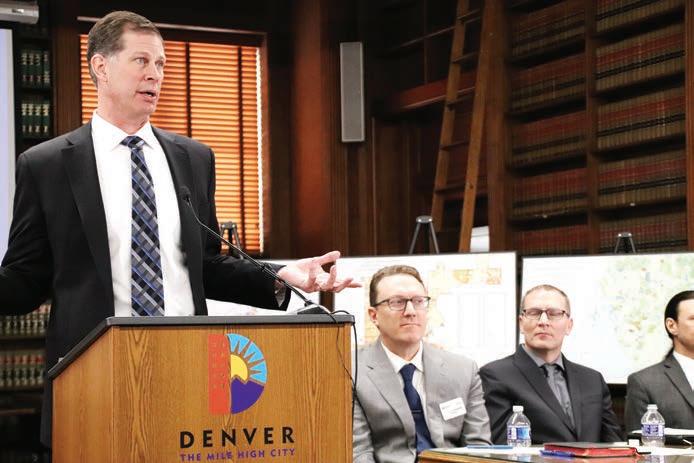
2 minute read
TAXES
County could act on tax relief


In a place with notably high home prices like Douglas County, the amount of increase in property tax bills could outpace many other areas of the state.
In Douglas County, residential properties saw increases in value between 30% and 60%, with a median of 47%. at includes singlefamily homes, condominiums and townhomes, according to Douglas County Assessor Toby Damisch. He’s the o cial who oversees the process of valuing property in the county.
Property taxes partly fund county governments, but they also fund school districts, re and library districts, and other local entities.
If Colorado voters decide to approve the Democratic state lawmakers’ proposal in November, the remaining amount of increase in property tax bills could still give Douglas County more revenue than it was expecting.

e budget that Douglas County o cials wrote for 2024 was based on expecting a 9% property value increase, omas, a county commissioner, has said.
“At 9%, we can deliver the services we need to. Obviously, I’m one of three (commissioners), but if there’s more than that, we would do a tax credit like we have ve of the seven years I’ve been a commissioner,” omas said.
If the increase is 10% or more, omas said she would vote for what’s called a “temporary mill levy credit” to reduce residents’ tax bills. (Property tax rates are o cially called “mill levies.”) e county has authorized such credits in 2017, 2020, 2021, 2022 and 2023, e ectively lowering county revenue by $30 million.
Plan comes with caveat
Colorado Democrats proposed a multi-pronged plan, and one of the parts is to cap the growth in district property tax collections, excluding school districts, at in ation. e catch: e Democrats’ plan would also allow local governments to override the cap after giving notice to property owners, according to the governor’s o ce. omas took issue with the timing of the proposal in this year’s state legislative session at the Capitol. She generally found the details of the Democrats’ proposal to fall short of a solution to how Colorado handles its property tax policy, saying more people should be represented at the table in hammering out a plan.
(“Districts” means any type of local government — such as counties, re ghting districts, metropolitan districts and others — that imposes a property tax.)


Going back to that general example of a home previously valued at $600,000, the increase in its property tax bill if the proposal is approved would be 12% if districts stay under the local cap, according to the governor’s o ce. But if the proposal goes through and governments waive the local cap, the home’s property tax bill would see a 19% increase, according to the o ce.
Living within a metropolitan district, such as Highlands Ranch, can make a big di erence in a home’s total property taxes, omas has said. Metro districts are a type of government entity that can o er some government services.

Asked whether he expects metro districts and other districts to waive the cap, Damisch, the assessor, said it’s likely that many districts would.
“I believe, based on historic precedent, unless there is a tremendous amount of political pressure and citizen engagement, that most special districts and such will waive the cap,” Damisch said.
She favors that “instead of having (talks) in a smoky dark room and popping this on all of us a week before the session ends,” she said.
Note: e state legislature’s regular session was set to end in early May, and the Democrats’ proposal could be amended after this story was nalized.






